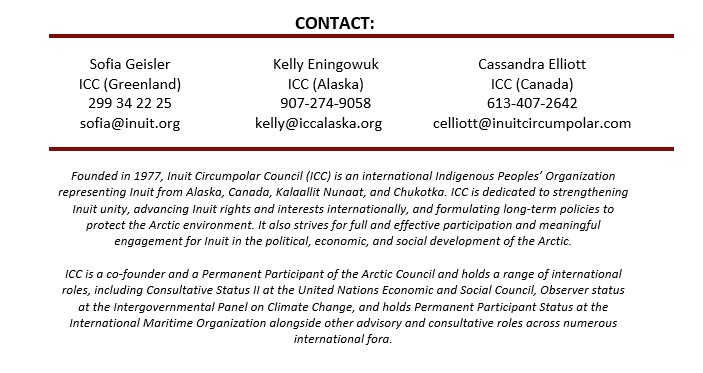14 November 2025— ICC attended the 6th Conference of the Parties (COP-6) of the Minamata Convention on Mercury, held from 3 – 7 November 2025 in Geneva, Switzerland. The ICC delegation comprised Herb Nakimayak (ICC Vice Chair), Gerald Lennie Inglangasuk (Board member, Fisheries Joint Management Committee (FJMC) Inuvialuit Settlement Region), Shannon O’Hara (FJMC Resource Person and Community Liaison), and Eva Kruemmel (Senior Policy and Research Advisor for ICC Canada).
In its interventions, Inuit Circumpolar Council (ICC) highlighted Inuvialuit biomonitoring activities, which were used to support the effectiveness evaluation of the Convention, as well as work of Canada’s Northern Contaminants Program and Arctic Council’s Arctic Monitoring and Assessment Programme.
“ICC will continue to monitor indicators for mercury in the Arctic and contribute to the implementation of the Minamata Convention,” said Herb Nakimayak, ICC Vice Chair. “Holistic monitoring that includes both Indigenous Knowledge and science ensures that we get the most accurate information to protect our way of life, harvesting, and our food security.”
ICC also co-organized a “Knowledge Lab” with Indigenous partners from the Amazon. The session highlighted informed about the connection between the Amazon as one of the most impacted source regions of mercury emissions through mercury use in so-called “Artisanal and Small-Scale Gold Mining”. This mercury is transported via the air and ocean currents from the Amazon to the Arctic, where it bioaccumulates in the Arctic ecosystem, and ultimately impacts Arctic wildlife and Inuit.
“It’s important that our food is safe to eat, and that information we generate is used to help reduce contaminants in our Arctic environment,” said Gerald Lennie Inglangasuk, who is also a active hunter, and Indigenous Knowledge holder. “I’m happy to contribute to this important work,”
Building on this partnership, ICC will continue to work closely with its Indigenous Peoples in the Amazon in exchanges on monitoring activities to aid knowledge generation and capacity-building to reduce mercury contamination in the environment and safeguard the Amazonian and Arctic ecosystems for our future generations.
“We are advancing Indigenous-led monitoring systems to identify and manage the impacts of mercury pollution. The long-standing experience of Indigenous monitoring in the Arctic is a reference model for us in the Amazon. We are committed to working together to develop models and practices that protect our peoples and serve as an inspiration and reference for other Indigenous Peoples facing similar challenges in other parts of the world,” stated Maglin Reonela Alvarado Vargas from the Federación Nativa del Río Madre de Dios y Afluentes (FENAMAD) / Nación Yine, who participated in the “Knowledge Lab”.
Prior to the COP-6 of the Minamata Convention, ICC Chair Sara Olsvig spoke at a pre-COP event organised by the UN Office of the High Commissioner for Human Rights (OHCHR), calling for the recognition of Indigenous Peoples as distinct rights holders, highlighting the inseparable relations between mercury pollution and Inuit rights. ICC recommended that the technical evaluations of the Minamata Convention include an assessment of the human rights impacts of mercury contamination.
At COP-6 ICC worked with other Indigenous Peoples’ representatives towards a new decision for enhanced Indigenous participation in the Minamata Convention. The decision was adopted in the evening of the last day, shortly before the meeting was adjourned. It includes reference to the rights of Indigenous Peoples as set out in the United Nations Declaration on the Rights of Indigenous Peoples, urges Parties (and invites others) to provide financial support, and requests the secretariat to seek further advice from Indigenous Peoples and the formally established International Indigenous Peoples’ Forum on Mercury for their further effective engagement. The next COP of the Minamata Convention will take place in June 2027 in Geneva, Switzerland.
